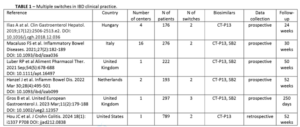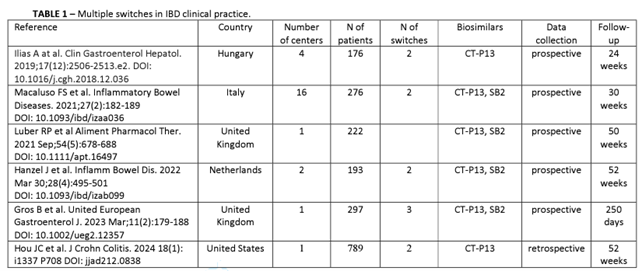HIGHLIGHTS
- The most crucial benefit of biosimilars is that they bring more significant cost reduction and increase access to advanced therapies.
- For this to occur, it is imperative not only to use biosimilars in naïve patients but also to switch to biosimilars in those patients who have started therapy with reference biologics.
- So far, studies have demonstrated effectiveness and safety of single switch between a reference product and a biosimilar.
- The purpose of this manuscript is to discuss whether scientific evidence is enough to support multiple switches of biologics and biosimilars in IBD patients.
ABSTRACT – Background –
Inflammatory bowel diseases (IBD) currently impose an immense social and economic burden on society in terms of both direct and indirect healthcare costs. Their incurable and progressive nature results in an unavoidable lifetime expense. The introduction of infliximab more than two decades ago had revolutionized IBD treatment. Nowadays, while biologic drugs comprise various vital therapeutic options for patients, they can be associated to significant costs to healthcare systems. The most crucial benefit of biosimilars is that they bring more significant cost reduction and increase access to advanced therapies. They also allow the treatment of newly diagnosed patients and dose optimization for those who need it. There is an inverse relationship between price and demand for treatment with biologics. For a more significant reduction in cost to be possible, greater use of biosimilars is necessary. For this to occur, it is imperative not only to use biosimilars in naïve patients but also to switch to biosimilars in those patients who have started therapy with reference biologics. At present, randomized and observational studies have demonstrated effectiveness and safety results in recommending a single switch between a reference product and a biosimilar, and vice versa. The purpose of this manuscript is to review the literature and discuss whether scientific evidence is enough to support multiple switches of biologics and biosimilars in IBD patients.
AUTORES
Fabio Vieira TEIXEIRA1, Laurent PEYRIN-BIROULET2,3 and Silvio DANESE



